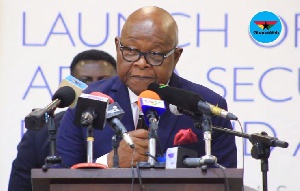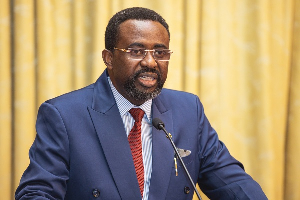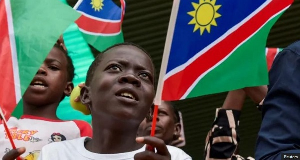The Speaker of Parliament, Prof Aaron Mike Oquaye has accused political researchers of inciting the electorate against the Members of Parliament following a recent research work on their performance.
The survey conducted by the Political Science Department of the University of Ghana, Legon, released on Monday, 10 June 2019 indicated that if elections were held today, about 49.5 per cent of Ghanaians will vote out their MPs due to their poor performance.
The survey also revealed that 42.6 per cent of the respondents are ready to retain their MPs with 7.9 per cent of the respondents undecided about whom to vote for.
Speaking on the floor of the House on Tuesday, 11 June 2019, Prof Oquaye accused the researchers of assessing the MPs wrongly, adding that such studies will affect the quality and performance of the lawmakers in the discharge of their constitutional mandate.
Prof Oquaye said: “It is important also that we should all sing from the same hymn sheet so as we are careful not to delight in MP-bashing as part of our culture in this society.
“I want to say authoritatively that these honorable members who have been in this house during this period have passed more bills into law than any other parliament in the history of this country. It is a statistical fact, verifiable, and I put my honour on it. That is something worth remembering. And the bills were passed into law by these very honorable MPs who are assiduously working in this direction.
“Statements, questions; admitted and responded to, also are part of the excellent record of this particular crop of MPs. Verifiable by any serious researcher and I put my honour on it. These are matters that should also be examined in such exercises in assessment.
“It is important for the public, in these circumstances, to be well-versed about the true nature and import of their representatives and I’ll implore researchers to please ply this road and help the public rather in understanding and assessing the works of MPs.
“No road, no vote is not part of the MP’s work. Honorable members of parliament are not voted any sums of money to construct roads and that is serious talk about the functions of parliament of Ghana. If anything at all, they can lobby and they can plead, but the MPs don’t build roads. The Common Fund has nothing to do with roads and if any person rates an MP because he or she has not built a road, then, of course, it is unfair.
“I’ll advise researchers that there are certain misconceptions for the role of MPs. These are people who must help rather than contribute to the misperception. And this is very important for national development otherwise they may be promoting an attrition rate that will not be in the best interest of this country.
“A member of parliament who is assessed without his or her work in committees cannot be said to be properly assessed. Therefore, you need to know the person’s contribution at committees because the committee is the workshop of parliament, [and this is] well-established throughout the world. That is where we do the nitty-gritty before we come to plenary and we should all understand these and make them part of our assessments.
“I will not want anybody to say that MPs and the Speaker don’t want them to be assessed but in assessment, 1. Methodology 2. The areas for assessment. If you don’t get the subject areas for assessment right then you cannot assess the person right. In other words, what is he or she supposed to do? And when you know what he/she is supposed to do in perfect harmony with the rules of engagement, then you can assess him.
“But you cannot assess him or her over something that is not even a constitutional duty of that person. I’ll, therefore, invite that our doors are open, all those who want to carry out such exercises, please it is not a matter that should be done in secrecy, it must be done openly and, in fact, research demands that before results are published, you seek explanation especially where adverse reports are published.
“The person must have the opportunity and that is why the Auditor-General’s report goes through a draft initially and when a person explains, then there’s a final report. Therefore, as much as there’s the need for some of these researches, we must be very careful about some of these things.
“I do not want to be misunderstood in saying I mean MPs should not be assessed. Some people will say: ‘Are they not human beings? Are they not also public officers?’ [But] this is not what we are saying.
“Like now, some are saying about our statement with regard to prosecution on days we are sitting. And, in fact, in our statement here, we did say MPs are subject to the law. Those who are [saying] that ‘they say they are above the law,’ they’re not being fair because we said clearly that on Mondays, days we are not sitting and holidays, let our constitutional protection on the way to the house [work] and so forth. During sitting days, the constitution says you cannot prevent him or her from doing that because of any questioning or trial or whatever. I plead that we should understand these things because honourable members of parliament are representatives of the people so elected...
“We’ll say that the leadership of the house should seriously contact those relevant persons and quickly make out certain areas for assessment with them. Making them understand the true intent and purpose of the work of parliament. We are ready to cooperate in all these things but the very areas of assessment must be clearly defined by the people.
“If the person [MP] is generous to dish out monies and it is upon that you’ll now say somebody else is not going to go back to parliament, you are making a sad mistake because it is not part of the business of the member to issue l’argent. If we do that the attrition rate will continue to rise, the quality will continue to come down and it will not be in the interest of the nation. I think we all as a nation must be very careful about this development”.
General News of Tuesday, 11 June 2019
Source: classfmonline.com

















